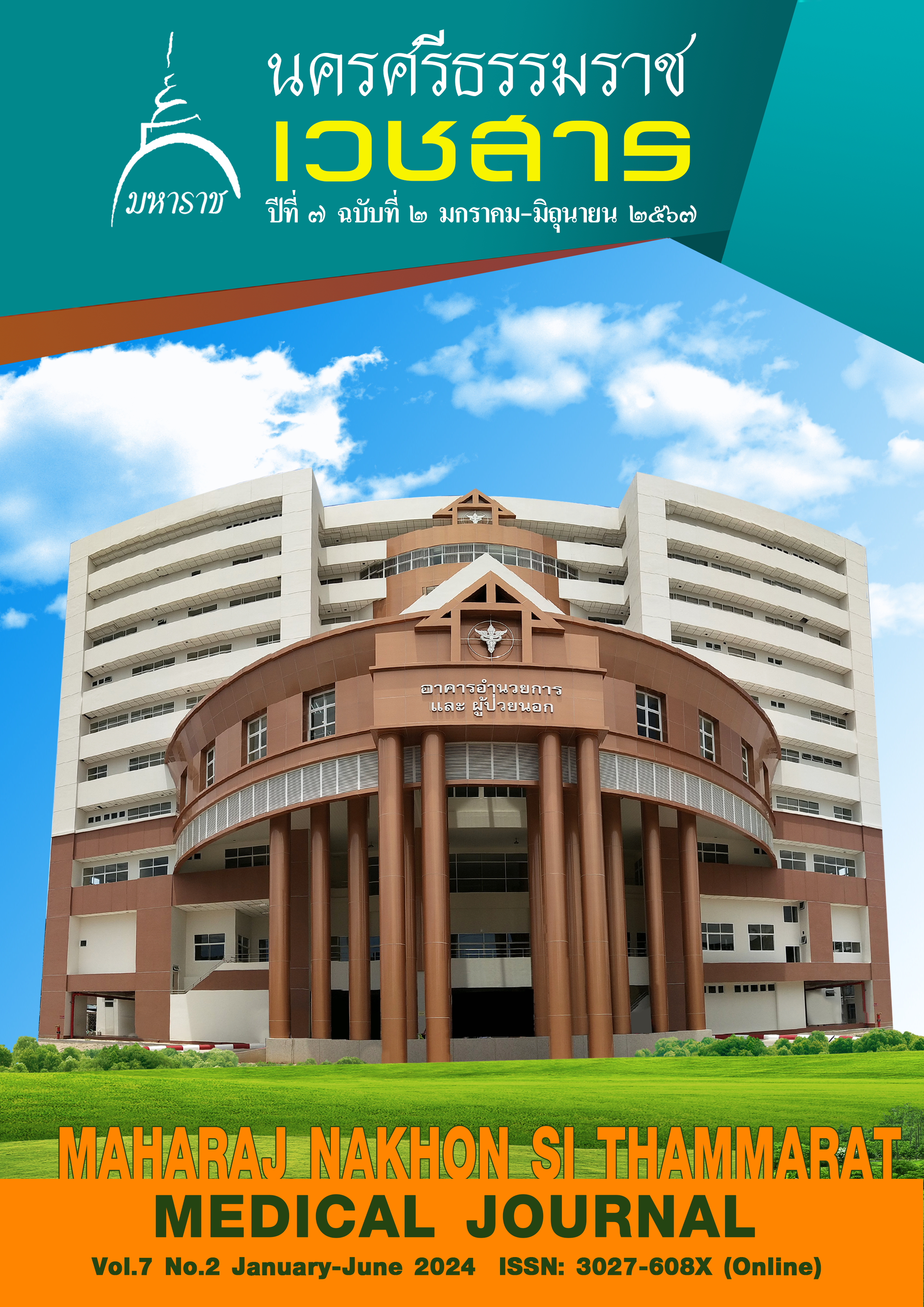ปัจจัยที่ส่งผลต่อการงดการผ่าตัดของผู้ป่วยที่ใช้บริการวิสัญญีกรณีไม่เร่งด่วน โรงพยาบาลวชิระภูเก็ต
คำสำคัญ:
การงดผ่าตัด, การให้บริการทางวิสัญญีบทคัดย่อ
บทนำ : การเลื่อนผ่าตัดเป็นปัญหาที่พบได้บ่อยในห้องผ่าตัด ส่งผลต่อการบริหารจัดการเวลาในห้องผ่าตัด ทำให้เกิดความล่าช้าในการรักษา รวมถึงเป็นตัวชี้วัดถึงประสิทธิภาพการบริหารจัดการทรัพยากรห้องผ่าตัด และคุณภาพการบริการของโรงพยาบาล การทราบถึงอุบัติการณ์ สาเหตุ และปัจจัยที่ส่งผลต่อการเลื่อนผ่าตัด ทำเกิดการวางแผนในการดูแลรักษาผู้ป่วยที่ดี ลดโอกาสการเลื่อนผ่าตัดให้น้อยลง เป็นการเพิ่มประสิทธิภาพ ในการใช้ห้องผ่าตัด ลดอุบัติการณ์การรักษาผู้ป่วยล่าช้า ส่งผลให้ผลการรักษาผู้ป่วยดีขึ้นตามมา
วัตถุประสงค์ : ศึกษาปัจจัยที่ส่งผลต่อการงดผ่าตัดของผู้ป่วยที่ใช้บริการวิสัญญีกรณีไม่เร่งด่วน โรงพยาบาลวชิระภูเก็ต
วัสดุและวิธีการศึกษา : การศึกษาแบบ retrospective case control study เก็บข้อมูลของผู้ป่วยที่มาผ่าตัดโดยใช้บริการทางวิสัญญีในกรณีไม่เร่งด่วนที่ถูกงดผ่าตัดทุกรายตั้งแต่วันที่ 1 มกราคม 2564 ถึง วันที่ 31 ธันวาคม 2564 โดยข้อมูลที่บันทึกได้แก่ ข้อมูลพื้นฐานของผู้ป่วย ได้แก่ อายุ เพศ ASA physical status ช่วงเวลาที่ทำการผ่าตัด แผนกที่ผ่าตัด วิธีการให้การระงับความรู้สึก และสาเหตุของการงดผ่าตัด อัตราส่วนที่ใช้ระหว่าง case : control คือ 1:1 และใช้ multivariate logistic regression analysis ในการหาปัจจัยเสี่ยงที่มีผลต่อการงดผ่าตัด
ผลการศึกษา : อุบัติการณ์การงดผ่าตัดโดยใช้บริการวิสัญญีกรณีไม่เร่งด่วน ตั้งแต่วันที่ 1 มกราคม 2564 ถึง วันที่ 31 ธันวาคม 2564 เท่ากับร้อยละ1.84 เมื่อทำการวิเคราะห์โดยวิธี multivariate logistic regression analysis พบว่า ปัจจัยที่มีผลต่อการงดผ่าตัด ได้แก่ เพศชาย (Adjusted Odds ratio, AOR 1.96, 95%CI 1.33-2.85) อายุ ≥ 65 ปี (AOR 2.20, 95%CI 1.41-3.44) วิธีการระงับความรู้สึกแบบ general anesthesia (AOR 1.68, 95%CI 1.11-2.54) และการผ่าตัดในช่วงเวลาราชการ(AOR 3.32, 95%CI 2.04-5.56)
สรุป : การทราบถึงปัจจัยเสี่ยงที่มีผลต่อการเลื่อนผ่าตัดอาจช่วยลดอุบัติการณ์การเลื่อนผ่าตัด ส่งผลให้เกิดการเพิ่มประสิทธิภาพในการใช้ห้องผ่าตัด ลดการอุบัติการณ์การรักษาผู้ป่วยล่าช้า ส่งผลให้ผลการรักษาของผู้ป่วยดีขึ้นตามมา และยังเป็นการเพิ่มคุณภาพการบริการของโรงพยาบาล
เอกสารอ้างอิง
Abate SM, Chekole YA, Minaye SY, Basu B. Global prevalence and reasons for case cancellation on the intended day of surgery: A systematic review and meta-analysis. Int J Surg Open 2020; 26: 55-63.
Xue W, Yan Z, Barnett R, Fleisher L, Liu R. Dynamics of elective case cancellation for inpatient and outpatient in an academic center. J Anesth Clin Res2013; 5: 314.
Rattanasuwan P, Tungwanchareon D, Wanpon K, Prachannuan C, Maneewan N, Sankod R. Causes of surgical cancellation of elective surgery in Srinagarind hospital. Thai Journal of Anesthesiology 2014; 40: 253-60.
Piyasuntrawong N, Sooktun S, Sooksri U, Chantorn P, Kongdan Y. The Incidence of postponement or cancellations in surgery and problem solving by participatory action research. Thai Journal of Nursing Council 2015; 30: 112-20.
Krawtawee A, Boonmad N, Jomthong W. Incidence and Causes of Elective surgery Cancellations in Songklanagarind Hospital. Songklanagarind Medical Journal 2014; 32: 327-38.
Wongkampuan R, Atthamaethakul W. Causes of Postponing or Cancelling Surgeries of Pre-appointment Patients, Ratchaburi Hospital. NJPH 2019; 29: 125-38.
Aidan T, Cavin C, Sijia W, Hairil A, Sean L, Marcus O, et al. Risk factors and reasons for cancellation within 24 h of scheduled elective surgery in an academic medical center: A cohort study. Int J Surg 2019; 66: 72-8.
Gruson KI, Lo Y, Volaski H, Sharfman Z, Shah P. Incidence and Risk Factors for Patient-related Short-term Cancellation of Elective Arthroscopic Surgery : A Case-matched Study. JAAOS Global Research and Reviews 2022; 6(4): 00034.
Pignaton W, Braz JRC, Kusano PS, Modolo MP, Carvalho LR, Braz MG, et al. Perioperative and Anesthesia-Related Mortality: An 8-Year Observational Survey From a Tertiary Teaching Hospital. Medicine 2016; 95(2): 2208.
Hopkins TJ, Raghunathan K, Barbeito A, Cooter M, Stafford-Smith M, Schoreder R, et al. Associations between ASA Physical Status and postoperative mortality at 48 h: a contemporary dataset analysis compared to a historical cohort. Perioper Med 2016; 5: 29.
Knoedler S, Matar DY, Knoedler L, Obed D, Haug V, Gorski SM, et al. Association of age with perioperative morbidity among patientsundergoing surgical management of minor burns. Front Surg 2023; 10: 1131293.
Zulfikar M, Nurmantu F, Habar T. Relationship between American Society of Anesthesiologists Classification (ASA Class) On Incidence Rate of Surgical cancellation in Pediatric Patients. IMJ 2020; 25: 217-22.
Watters DA, Babidge WJ, Kiermeier A, Mcculloch GA, Maddern GJ. Perioperative Mortality Rates in Australian Public Hospitals: The Influence of Age, Gender and Urgency. World J Surg 2016; 40: 2591–7.
Fleisher LA, Fleischmann KE, Auerbach AD, Barnason SA, Beckman JA, Bozkurt B, et al. 2014 ACC/AHA Guideline on Perioperative Cardiovascular Evaluation and Management of Patients Undergoing Noncardiac Surgery: Executive Summary. Circulation 2014; 130(24): 2215-45.
Viftrup A, Dreyer P, Nikolajsen L, Holm A. Surgery cancellation: A scoping review of patients' experiences. J Clin Nurs 2021; 30: 357-71.
Yokozuka K, Tomita K, Nakagawa M, Koganezawa I, Ochiai S, Gunji T, et al. New risk factors of post operative complications in elective gastrointestinal surgery of elderly patients: a prospective cohort study. BMC surgery 2021; 21(1): 173.
ดาวน์โหลด
เผยแพร่แล้ว
รูปแบบการอ้างอิง
ฉบับ
ประเภทบทความ
สัญญาอนุญาต

อนุญาตภายใต้เงื่อนไข Creative Commons Attribution-NonCommercial-NoDerivatives 4.0 International License.
เนื้อหาและข้อมูลในบทความที่ลงตีพิมพ์ในมหาราชนครศรีธรรมราชเวชสาร ถือเป็นข้อคิดเห็นและความรับผิดชอบของผู้เขียนบทความโดยตรงซึ่งกองบรรณาธิการวารสาร ไม่จำเป็นต้องเห็นด้วย หรือร่วมรับผิดชอบใด ๆ
บทความ ข้อมูล เนื้อหา รูปภาพ ฯลฯ ที่ได้รับการตีพิมพ์ในมหาราชนครศรีธรรมราชเวชสาร ถือเป็นลิขสิทธิ์ของมหาราชนครศรีธรรมราชเวชสาร หากบุคคลหรือหน่วยงานใดต้องการนำทั้งหมดหรือส่วนหนึ่งส่วนใดไปเผยแพร่ต่อหรือเพื่อกระทำการใด จะต้องได้รับอนุญาตเป็นลายลักษณ์อักษรจากวารสารมหาราชนครศรีธรรมราชเวชสาร ก่อนเท่านั้น



